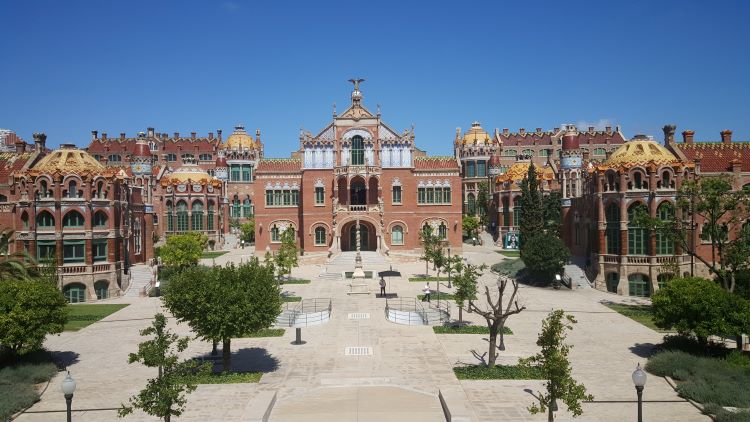Eduardo González
The Minister of Foreign Affairs, José Manuel Albares, will participate today in Barcelona in the eighth Regional Forum of the Union for the Mediterranean (UfM), an event that has been boycotted by Israel in protest at the decision of its organizers to change the agenda to address, almost exclusively, the current crisis in the Middle East.
The meeting was initially planned to address the organization’s efforts on its fifteenth anniversary and its reform, but the foreign ministers of the Euro-Mediterranean region “will focus their debates on the critical situation in Israel, Gaza-Palestine and the consequences in the region,” according to the UfM in a press release. “The Forum will provide the opportunity to analyze the dramatic situation in the area and reflect on the way forward to reach a solution,” it added.
Last Thursday, the Government of Israel decided not to attend the Regional Forum precisely because of the changes in the original agenda of the meeting, as reported by the Israeli Embassy in Spain. No member of the Israeli Government nor its ambassador in Madrid, Rodica Radian-Gordon, will attend the meeting, despite the fact that they are scheduled to meet in Barcelona today for other matters.
In its note, the Embassy recalled that “the Union for the Mediterranean is a practical platform to promote cooperation between different countries for the benefit of all the peoples of the Mediterranean.” “The decision to change the original agenda and focus solely on the current conflict was made without consulting Israel,” he continued. “This undermines the purpose of the UfM and risks transforming it into another international forum in which Arab states attack Israel. Therefore, Israel has no intention of participating in the meeting,” she concluded.
The boycott of Israel also coincided with the trip of the President of the Government, Pedro Sánchez, to Israel, Palestine and Egypt. During this tour, in which he was accompanied by the Prime Minister of Belgium, Alexander de Croo, the Chief Executive was especially harsh with the Israeli Prime Minister, Benjamin Netanyahu, to whom he warned that Israel’s response is being “disproportionate.” ” and that “the fight against terrorism cannot be done with force alone.” “The number of dead Palestinians is truly unbearable. “There must be a clear distinction between military objectives and the protection of civilians,” he asserted.
However, the biggest diplomatic problem – which led the Israeli Foreign Minister, Eli Cohen, to summon the Spanish ambassador in Tel Aviv, Ana Salomon, and Albares to do the same with the Israeli ambassador in Madrid– occurred after statements by Pedro Sánchez from the Rafah step in which he stated that “the indiscriminate killing of innocent civilians, including thousands of boys and girls, is completely unacceptable and assured that Spain “will continue to demand a lasting ceasefire,” because “this ceasefire is a great step.” , but it is not enough, a permanent humanitarian ceasefire is needed.” According to Cohen, these words “represent support for terrorism.” José Manuel Albares described these accusations as “totally false and unacceptable.”
The Forum will bring together representatives of the 43 UfM member states (except Israel) and will be co-chaired by Josep Borrell, High Representative of the European Union for Foreign Affairs and Security Policy and Vice-President of the European Commission, and Ayman Safadi, Deputy Prime Minister. and Minister of Foreign Affairs and Expatriates of Jordan, in the presence of the Secretary General of the UfM, Nasser Kamel.
The Forum will be hosted by José Manuel Albares and will have the participation of the Minister of Foreign Affairs of Saudi Arabia, Prince Faisal bin Farhan, representing the Arab-Islamic Ministerial Committee. The meeting, which will be held at the Modernist Campus of Sant Pau and can be followed openly through the UfM website, will begin at nine thirty in the morning and will conclude around one in the afternoon with a press conference joint work of José Manuel Albares, Ayman Safadi, Josep Borrell and Nasser Kamel.
Sánchez’s proposals
On October 16, Pedro Sánchez offered, during an extraordinary meeting of the European Council called on an emergency basis to analyze the situation in the Middle East, the possibility of raising the political profile of the UfM meeting, in which “Israel and Palestine will sit on equal terms,” to address the crisis and avoid a regional escalation of the conflict.
Ten days later, Sánchez proposed to the European Council in Brussels the holding of an international peace conference for the Middle East so that “the entire international community feels involved” in favor of the two-state solution. Finally, the 27 agreed, in their final declaration, to “reactivate a political process based on the two-state solution” and showed “their support for the early holding of an international peace conference,” without further details.
Foreign Ministry sources have not been able to specify to The Diplomat what the exact content of Albares’ speech at the UfM Regional Forum will be, but they have recalled that the proposal for the peace conference has been repeated in all of Sánchez’s interventions. and the minister every time they have referred to the situation in the Middle East in recent weeks, so it is more than foreseeable that Albares will take advantage of the meeting to launch it again before an audience much larger than the EU but in which, however, Israel will not be there.







